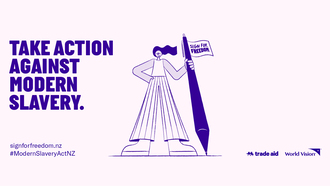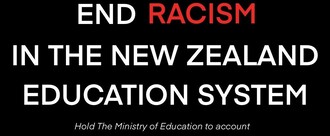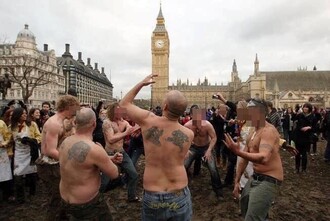-
Take Action against Modern Slavery40 million people globally are in modern slavery. Unlike many other countries, New Zealand has no legislation that requires companies to undertake due diligence looking into the risks of modern slavery within their supply chains and taking actions to address those risks. Modern Slavery legislation is a key way for New Zealand companies to work together to eliminate modern slavery in private and public sector supply chains. WHAT IS MODERN SLAVERY? Modern slavery is the severe exploitation of other people for personal or commercial gain. Modern slavery is in the clothes you wear, the coffee you drink and the goods you love. WHY DO WE NEED A MODERN SLAVERY ACT? 40 million people globally are in modern slavery. There are more people in slavery now than in any other time in history. The world is small and interconnected. Every time we purchase a product there is a chain reaction felt around the world. No country or industry is unaffected. Unlike many other countries, New Zealand has no accountability legislation that addresses transparency in supply chains. This means that New Zealand companies could unknowingly be importing products or services by which people are exploited and enslaved. WHAT WOULD A MODERN SLAVERY ACT DO? Modern Slavery Acts make it easier for a consumer to expect slavery-free products and services from companies. They help prevent slavery through transparency and accountability. They require businesses to understand the risks of modern slavery in their purchasing, to report on those risks and take action to address them. They give the business community guidance and a level playing field. For further information, resources and to get involved check out our campaign website - https://www.signforfreedom.nz/20,874 of 25,000 SignaturesCreated by Trade Aid and World Vision .

-
Open Letter - Let's show compassion to the Uyghur CommunityUyghur Solidarity Aotearoa NZ and Khadija Leadership Network are inviting you to sign this open letter to our Members of Parliament to consider Uyghurs as refugees under our Refugee Quota Programme. As time passes, we are all becoming familiar with the inhumane treatment of Uyghurs in China with over a million people being detained in camps without cause and against their will. As New Zealanders, we take pride in taking a global stance on issues of human rights, and our organisations are now inviting our decision-makers to consider how we could be doing more for the Uyghurs. Our government took a similar stance for asylum seekers detained in Australia. Considering the Uyghurs as part of our Refugee Quota Programme is a clear yet diplomatic way of showing China - and the international community - that we do not agree with these human rights abuses. The letter will be sent to all of our MPs, and we hope it yields further conversations with them in making this aspiration possible with the support of your endorsement. A huge thanks in advance from us if you decide to sign and support this kaupapa.1,367 of 2,000 SignaturesCreated by Khadija Leadership Network

-
Deplatform Sia's ableist movie 'Music'This film is ableist and includes the torture of Autism Spectrum Disorder people with a restraint method that has caused death and is a cause of massive trauma for those who have survived it. I'm really terrified about the underdiagnosis of autism. I spent 36 years not getting diagnosed for it because of media portrayals like this that are inaccurate and harmful. The fact that this has been greenlit by NZ's cinema complexes is highly disturbing. This will do damage to the ASD community as well as prevent people from getting treatment for ASD. The under diagnosis of ASD because of bad science and media portrayals has been labelled a "lost generation". You can read a harrowing paper on the effects here in a very accessible format for non-science people: https://www.liebertpub.com/doi/full/10.1089/aut.2019.006915 of 100 SignaturesCreated by Rory McCarthy

-
Give the Waikeria Uprising protesters food and waterThe way the Department of Corrections is currently handling the Waikeria Uprising breaches the human rights of these protesters. As human beings, the protesters deserve food and water. Currently, Corrections is denying them this and won't allow anyone in to deliver these basic needs. It would be an important sign of good faith to the protesters if they are granted this basic human right. Is New Zealand a country that starves people who are protesting for basic human rights?8,782 of 9,000 SignaturesCreated by People Against Prisons Aotearoa

-
Consent Education should be compulsory for First-Year Tertiary StudentsIn a world free from sexual violence, students would be able to learn and achieve, without fear, harm or violence. Students would be able to walk through campus, attend lectures, engage in tutorials, knowing that they are valued, respected, and treated equally. Starting tertiary study is an important time in a young person's life, and sets them up for their entire life course 'pipeline'. When a student faces barriers or trauma during their study, it often has lifelong ripple effects and consequences. Recent research shows that 1 in 3 students will experience sexual harm during study [1], and this mirrors Thursdays in Black's own findings, which highlighted that over 50% of participants had experienced some form of sexual harm during study [2]. Research on wider populations shows that in Aotearoa, 1 in 3 women, 1 in 6 men, and 1 in 2 transgender people will experience sexual harm. Research also shows that women, Māori, Queer/Takatāpui, and disabled students are at significantly higher risk of experiencing harm in comparison to other identities, and that 90% of sexually harmful situations happen between people that know each other, for example friends, relationships, colleagues, or family. At Thursdays in Black, our vision is to improve these circumstances, by mandating sexual consent education for first years students. This education will empower young people by giving them the skills to navigate and create their own healthy sexual relationships, help prevent harmful behaviours, and contribute to the ongoing culture change of tertiary institutions. By teaching these skills to students aged 17-20, we will be setting them up with a kete of tools that will benefit them throughout their life, and help make our communities safer. Yet at present, there is no legal requirement for tertiary institutions to offer compulsory courses to teach students about sexual consent. New Zealand institutions currently have a fragmented approach to consent education, with different institutions offering different levels of engagement, different approaches, and some with out any programmes at all. At Thursdays in Black, we believe that Aotearoa can do better, and see that implementing such an education policy as not only urgent, but long overdue. We request that the Minister pass legislation requiring tertiary institutions in Aotearoa to provide sexual consent education to all first-year tertiary students. Such education should be a research-based program, created with and facilitated by subject matter experts and the sexual violence sector, it should engage student leaders, operate on a bi-cultural model that upholds Te Tiriti o Waitangi, and reflect an intersectional approach that respects the disproportionate impact sexual violence has on specific groups. Tertiary institutions, for the most part, remain out-dated and traditional in their thinking -- often reinforcing a rape culture of power imbalances, misogyny, and toxicity. This does not make a safe environment for our tertiary students. Help make education safe. Sign the petition today to call on the Minister to implement compulsory consent courses for first-year students. 1. Unpublished Phd Thesis by Kayla Stewart, for a preliminary discussion of her findings, see https://www.stuff.co.nz/national/113090659/a-third-of-women-university-students-report-being-sexually-assaulted-what-do-we-owe-them 2. In 2017, Thursdays in Black Aotearoa conducted a report titled ‘In Our Own Words’, which details the extent to which tertiary students experienced sexual violence prior to, and during, their studies You can find it here: https://library.nzfvc.org.nz/cgi-bin/koha/opac-detail.pl?biblionumber=5557922 of 1,000 SignaturesCreated by Jahla Lawrence
-
Supporting paid leave for women after abortionsThe United Nations 2030 Agenda for Sustainable Development has a focus under Goal 5 on safe abortion as part of protecting “human rights and promoting gender equality and the empowerment of women and girls”. Target 5.6 seeks to ensure “universal access to sexual and reproductive health and reproductive rights as agreed in accordance with the Programme of Action of the International Conference on Population and Development and the Beijing Platform for Action and the outcome documents of their review conferences”. We believe that the Holiday Amendment Bill act could be changed to better suit the goals of the UN 2030 Agenda for Sustainable Development and to better support women in Aotearoa. We hope you consider our suggestion as young people and women going into the workforce. As a society, we believe we need to do more to ensure women have equal rights and have equitable working conditions. Thank you for helping us in our fight to remove the word ‘unplanned’ from Ginny Anderson’s Holiday Amendment Bill. Ngā mihi, Lorna Hallett Renee Hamilton Kate Chu Athena Kapralos Ella Murdoch Evie Harrington Bella Redshaw Bintou Fiti-Jaiteh Natasha Taylor Valora Leilua-Tiatia Tia-Rhiena Martin-Upton Nicole Askari Ruby McGovern Sophie Irving187 of 200 SignaturesCreated by Lorna Hallett
-
Support families in need. Extend the Winter Energy PaymentAs New Zealanders, we believe in justice and compassion. We want everyone to have the opportunity to thrive. But, right now, hundreds of thousands of people in our country are living in poverty. Despite our differences, we share a responsibility to make sure everyone has a decent standard of living and the same chances in life. Poverty in New Zealand affects people of all ages and situations – children and their parents, young adults, people in and out of work and people with disabilities. The stress that comes with poverty can erode people’s mental and physical health. Showing compassion as a society means making sure no-one has to endure the harms of poverty. On October 1, 2020, the Winter Energy Payment that is provided to people on government income support, to assist with heating a home, is due to expire. This will cut the already low incomes for people locked in poverty by $63 a week for couples and $41 a week for an individual. But as research has shown, $40 - $60 less per week means not being able to go to the dentist or doctor, not being able to afford emergency bills and not being able to pay for kids to participate in extracurricular activities like sports, art or volunteering. At a time where food banks are reporting record demand and the number of people needing government income support had its biggest jump in 24 years in April, the government needs to show some compassion. By permanently extending the Winter Energy Payment, the government can help make it possible for everyone to do well.861 of 1,000 SignaturesCreated by Nick Stoneman
-
Recognise the rights of mokoMoko, a divine treasure etched into the skin to enhance the cultural identity of Māori in New Zealand. Moko, beautiful markings reflecting the whakapapa (geneology), history and mana of the wearer. Moko, an important traditional practice used by Maori since time immemorial. Please support this petition to include 'moko','moko kauae','mataora', 'ta moko' as prohibited grounds for discrimination. History tells us our tipuna enjoyed freedom of movement as moko wearers, a legacy we should able be able to carry on as well.8,573 of 9,000 SignaturesCreated by Rangimiria Ihakara
-
Youth Justice Demerit Points Bill Fails Young People: Ask the Select Committee to reject it!To the Social Services and Community Committee We ask that you reject the Oranga Tamariki (Youth Justice Demerit Points) Amendment Bill. This Bill, though well intentioned, fails to understand and respond to the complex and layered challenges facing our rangatahi. At the heart of this bill lies a lack of understanding of the drivers behind youth offending, and the sort of interventions needed to support rangatahi to thrive. According to the Youth Offenders summary report in 2019, of those referred to a FGC, 94% of kids 11-13, and 81% of young people aged 14-17 had been the subject of a report of concern to Oranga Tamariki relating to their care and protection. This data highlighted "that young people who offend often have complex problems, which can be among the underlying causes of their offending." If you speak with Youth Development Workers, or Social Workers supporting these rangatahi and whanau, they will testify to the reality that a large proportion of rangatahi who end up reoffending are often victims of abuse, with a history of poverty, mental illness, housing instability, intellectual disability, and severe trauma. They are also predominantly Maori, facing regular, and constant discrimination. The Youth Justice Demerit Points bill fails to provide an answer to these very real and significant issues that lie at the root of youth offending. Another failure of the Bill is its assumption that our inability to support rangatahi early enough is a failure of identification. However, if you once again were to speak to Youth Development Workers, Social Workers, and other community workers who are serving and supporting our whānau and rangatahi, they will tell you that identifying rangatahi at risk of reoffending is not the problem. Our communities know who these young people are. The issue lies in the lack of resources and supports available for young people within our community. The idea of using demerit points to characterise young people, is also out of step with the Government's own Youth Development Strategy Aotearoa (YDSA). The YDSA commits the Government to thinking about, and walking alongside young people utilizing a Strength Based approach. The YDSA outlines that any additional support designed for young people "needs to be consistent with the youth development approach - that is, it needs to avoid defining the young person as 'the problem'." The Youth Justice Demerit Points Bill is out of step with the YDSA. It fails to approach our young people in a strength based manner, and it contributes to further stigmatizing and marginalizing young people. We are also concerned about the negative impact labeling our young people with Demerit Points will have on their overall mental and emotional well-being. Instead of passing a bill that will have very little direct impact on reducing the risk of a young person re-offending, we ask that Parliament turns its focus to: ★ Reviewing the Family Group Conferences (FGC) system: Audit the FGC system and provide the necessary resource and support needed to ensure that it is functioning in a manner consistent with the principals of Restorative Justice and Youth Development. ★ Focus on Early Intervention: Provide local communities with resourced and dedicated support so that they can meet the needs of the young people in their communities who are struggling and at-risk. ★ Develop a Strategy to address the Youth Homelessness crisis: We know that when young people experience homelessness they are more likely to offend as a matter of survival. A Youth Specific Homelessness Strategy would address the factors that lie at the root of youth offending. Child poverty, mental illness, disability, unstable and inadequate housing, trauma, discrimination and racism are all factors that would be addressed. Young people living in stable housing, with their mental, emotional, spiritual and physical well-being taken care of, are less likely to become involved in the Youth Justice System. ★ Provide each young person entering the Justice System with a trained Youth Development Worker: A service designed in consultation with the Youth Development Sector, with a specific focus on supporting rangatahi who enter the Youth Justice system, would be one way to provide early intervention to rangatahi as soon as they enter the system. If each rangatahi had a dedicated Youth Development Worker, their needs could be assessed immediately, and they would than be able to be connected to the right supports before they become entrapped within the system. The Oranga Tamariki (Youth Justice Demerit Points) Amendment Bill fails to understand or acknowledge the driving factors behind youth offending, and thus it fails to adequately respond. For this reason, the Bill should fail. You can read more about our concerns with the Bill here: https://whenlambsaresilent.wordpress.com/2020/07/30/will-demerit-points-stop-youth-offending-a-j-hendry/ You can find the bill here: http://www.legislation.govt.nz/bill/member/2020/0229/latest/whole.html#LMS323852411 of 500 SignaturesCreated by Aaron Hendry
-
End Systemic Racism in New Zealand SchoolsThe education system's purpose should be to nurture and support children, unfortunately this is not the case. Not all children are treated equally in our current system. Countless children have experienced racial abuse in the New Zealand education system, this disturbing problem has persisted for decades with little to no improvement. The effects of racial abuse on children has been well documented in academic literature. The Ministry of Education has been negligent in their response to the problem and have failed to protect vulnerable children from racial abuse. https://www.renews.co.nz/endless-stories-of-racism-in-nz-schools/ Testimonies of racial abuse victims will be included with this petition. Testimonies of racial abuse can be emailed to [email protected] or @ngati_frybread on Instagram. If you sign this petition please also consider to writing your local MP with your thoughts on this kaupapa. https://www.parliament.nz/en/mps-and-electorates/members-of-parliament/ We can make change, ngā mihi!4,969 of 5,000 SignaturesCreated by Ngati Frybread
-
Remove 'Waitangi Day' from the Waitangi Day Circle Line Pub Crawl event name & cancel the drunk HakaThis is important because the inclusion of Waitangi Day in the pub crawl title enables and perpetuates the dishonouring of Te Tiriti o Waitangi and is culturally insensitive. It also provides (and has done so on many accounts) an opportunity for intoxicated pub-crawl-goers to try to perform the Haka while wasted. The Pub Crawl (that has been going for 37 years) encourages New Zealanders in the UK to drink a lot of alcohol and 'celebrate' Waitangi Day by dressing up as 'kiwi icons' (eg. beer brands and marmite) and hop from one British Pub to another. As well as this, photographs have long-ago emerged of people trying to imitate traditional Māori Korowai, Tipare and drawn-on Moko Kauae poking out tongues and attempting pukana. Does this enhance mana? Does this contribute to British & European people seeing Haka performed incorrectly in London and therefore enables more terrible 'performances' of Ka Mate and Tika Tonu? Does the use of Waitangi Day by a non-Māori lead organisation and community respect the pain, loss and struggle Māori people have endured and still fight for when it comes to Te Tiriti and the reclamation of land, reo and culture? Related links: The Spinoff Article - There's something off about the Waitangi Day Pub Crawl by Madeleine Chapman https://thespinoff.co.nz/atea/06-02-2019/theres-something-off-about-the-london-waitangi-day-pub-crawl/ NZ Herald Article - Pleas for drunk Kiwis to abstain from haka during London Waitangi Day Pub Crawl by Michael Neilson https://www.nzherald.co.nz/nz/news/article.cfm?c_id=1&objectid=12305813 Te Ao Tapatahi Interview with Creator of Petition - Ashley Clark https://www.facebook.com/watch/?v=2957233182201501,424 of 2,000 SignaturesCreated by Ashley Clark
-
BLACK LIVES MATTERA black person is just human like everybody else. There is no reason for a black person to feel scared to approach somebody just because they are scared of how that person would react because of the colour of their skin. The story of George Floyd is just enough to explain this, a normal black man but suspected of a crime. He had allowed the officer to arrest him but the officer was still violating his rights while George begs him saying 'I can't breathe'. This whole situation resulted in George losing his life. George had no gun on hand but he was murdered purely because of the colour of his skin. Since January 1st, 2015, 1,252 black people have been shot and killed by police, according to the Washington Post's database tracking police shootings; that doesn't even include those who died in police custody or were killed using other methods. Often there is no need for the police to use weapons but it is just purely because the victims are black that the instinct of the police is to shoot. Every loss hurts it really does. We live in a colonised country here in Aotearoa, and that our solidarity includes standing against racism and I think it is time the silence is broken. Let us not forget things have fired up in America but this shows us what a lot of black people are facing around our world even in our very own backyard. We have taken on so much as black people and have had excessive patience but ENOUGH IS ENOUGH.537 of 600 SignaturesCreated by Kalkidan Yohannes










.jpg)

